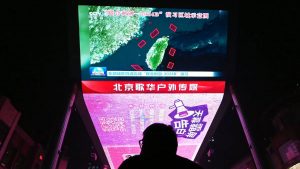
Mayday: Taiwan rock stars deny breaking China’s lip syncing ban

A popular Taiwanese rock band has denied allegations of lip syncing in China, where it is prohibited.
This comes after Chinese authorities announced an investigation against Mayday, in response to a viral video.
Commercial regulations in China prohibit lip syncing before paying audiences because it is “deceptive”.
However, this is rarely enforced and lip syncing is not uncommon for performers in China.
Some Chinese social media users questioned why Mayday is being singled out when many performers, even those who appear on state television, are believed to lip sync.
However, others said they would be disappointed if it is proven that the band lip synced at their Shanghai concert on 16 November.
Lip syncing or “deceptive fake-singing” before paying audiences is punishable by a fine of 100,000 yuan ($14,110, £11,240). Artists can also be banned from performing and their show organisers could have their licences revoked.
Mayday frontman Ashin – whose real name is Chen Hsin-hung – addressed the allegations in a social media post on Wednesday. The 48-year-old said “real-singing” is the only way to connect to Mayday fans.
“Every roar, every performance, every note, they all come from the voice that I have relied on 24 years,” he said, while referencing one of their songs.
Mayday’s label B’in Music said the band does not lip sync in their concerts and that they are cooperating with the investigation, being led by the Shanghai Bureau of Culture and Tourism. The BBC has also sent a request for further comment.
Mayday exploded into the Chinese-speaking market in 1999 with “positive rock music”. They sing about love, courage and reaching for one’s dreams. Their success has been compared to Maroon 5 and Coldplay.
They are among the most successful Taiwanese acts in mainland China, a market that has become increasingly challenging for Taiwanese celebrities due to cross-strait tensions. China sees self-ruled Taiwan as a breakaway province that will eventually be under Beijing’s control.
Maitian Nongfu claimed that five of the 12 songs he looked into were lip synced, and one was mixed with real singing. His analysis was posted on the popular video-sharing platform Bilibili.
“I was shocked. Nearly half of the songs were lip synced at their own concert, this is indeed beyond my comprehension,” Maitian Nongfu said in the video, which has been viewed millions of times as of late Thursday.
His allegation went viral. On Weibo, where Mayday’s official account has nearly five million followers, users debated whether the band had indeed lip synced and the possible consequences if they did.
“Deceiving consumers by lip syncing at a concert that sells tickets, isn’t this a more serious matter?” a Weibo user said in a post that has been read 40,000 times.
Some Mayday fans defended the band. “The user who evaluated their music should also be evaluated for whether his methods are reliable,” one social media user said.
Shanghai authorities said they would respond to complaints online against the band after the investigation ends.
BBC












Comments